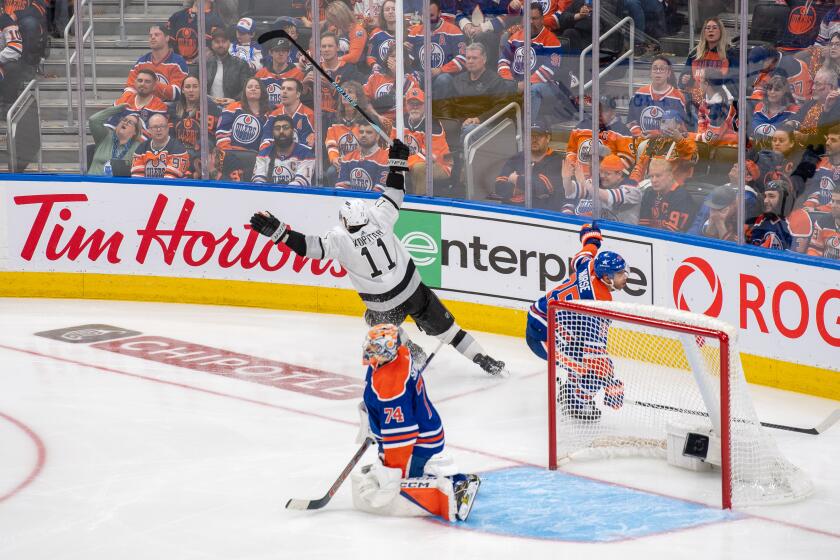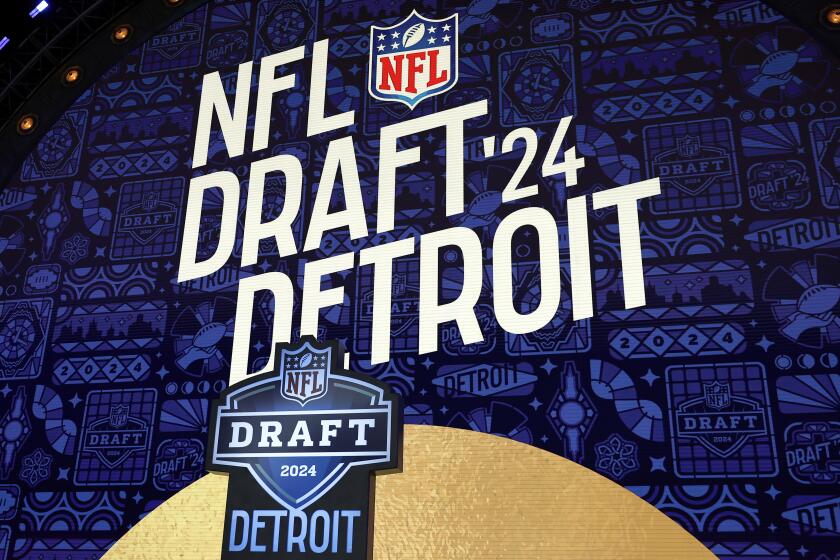The Saga of CBS (Can’t Broadcast Sports?) and the Fox : Television: Is CBS’ eye bloodied? How costly was Fox’s Hail Mary play? An analysis of the NFL possession of the decade.
The new joke around Fox--the new home of the Los Angeles Rams, San Francisco 49ers and Dallas Cowboys--is that the fourth network’s top executives are all out on some interstate somewhere, chasing down flamboyant CBS football announcer John Madden’s bus so that they can sign him up for next season and pair him with famed cartoon brat Bart Simpson to create the most animated play-by-play team in history.
The mood was jubilant this week at Fox after the network wrested the National Football Conference from CBS with an astronomical bid that some analysts insist will lose Fox at least $100 million a year. “We started off the day with a case of champagne,” said Lucie Salhany, chairman of Fox Broadcasting.
The halls of CBS Sports, which has televised the NFL ever since the pro game first came to television in 1956, were not filled with much holiday cheer.
“We are all very depressed,” said Sandy Grossman, the veteran producer of NFL games featuring Madden and Pat Summerall. “It was a shock. It was like a death in the family. I’ve been doing football here for over 30 years. I can’t believe it.”
Summerall said that he was “numb . . . and heartbroken.” Broadcasting NFL games “has been such a part of my life, I couldn’t see myself without it.”
“It’s a terrible disappointment. Sadness. And it comes as something of a surprise,” said CBS Sports president Neal Pilson. CBS Sports, which will no longer broadcast Major League Baseball either, will carry the Winter Olympics in February and after that, only college basketball, golf and U.S. Open tennis.
The joke going around is that CBS now stands for Can’t Broadcast Sports. Cutbacks in the network’s sports department are inevitable; many of its high-profile football announcers like Madden and Terry Bradshaw will be looking for a new team.
“It’s like we have no season now,” said Jim Gray, a reporter for CBS Sports. “It’s true CBS has the NCAA basketball tournament . . . and the Masters (golf tournament), but the Masters is only one week. It’s sad.”
CBS was blindsided by a young network’s quest to position itself as an indispensable part of the soon-to-be 500-channel universe. Buying the rights to one of the sports world’s most prestigious products “definitely makes us one of the Big Four,” Salhany said. Fox’s four-year NFC package includes teams in many of the nation’s most populous markets including the New York Giants, Chicago Bears and Washington Redskins. It also includes the 1997 Super Bowl.
“In the world of tomorrow when there will be more and more competition and the audience will be more and more fragmented, having the NFL right alongside the Fox brand image is critical,” she said. “This prepares us for all the new competition because anytime you can have something that is in low supply and high demand, that’s what you want.”
Fox spent close to $1.6 billion for a sport that was losing millions for CBS and for NBC, which retained the rights to the less expensive American Football Conference games this week. Some CBS executives and other industry observers predict that Fox will lose $600 million over the four-year package.
Joel Segal, an executive at McCann-Erickson advertising agency, said that ratings on Fox for NFL games were likely to be 10% to 15% less than on CBS simply because Fox does not have as many affiliates and most of its 139 stations are of the high-numbered UHF variety. (Most of the network’s eight owned stations, including KTTV Channel 11 in Los Angeles, are the stronger-signal VHF.) For viewers who subscribe to cable, UHF is no problem. But for those who don’t, the signal in some areas is weak, and will precipitate lower prices for ads on NFL games, Segal said.
But Fox clearly was not focusing solely at the football bottom line. It was looking at taking a 7-year-old network--with a hodgepodge of prime-time programming, a failed late-night franchise and as yet no major news department--into the big leagues. The move also is a preemptive strike against the two proposed new networks from Time Warner and Paramount, which will need to assemble a network of stations to carry their programming.
*
“For Fox, this is something of a defensive and an offensive strategy,” said John Mansell, senior analyst for Paul Kagen Associates. “Defensive in that they would like to keep affiliates in tow and prevent any defections to these new networks. And offensive in the sense that they want to grow their own network and enhance public perception and advertisers’ perception.”
The benefits to Fox outlined by Salhany and other analysts include drawing new, sports-oriented advertisers, who then might be persuaded to buy time on other Fox programming, and enjoying a whopping Sunday afternoon football audience, which will then be open to promotional spots for other Fox programs and provide a large lead-in to the network’s Sunday night prime-time lineup. TV observers point out that CBS’ winning Sunday night has benefited from large football lead-ins.
“This is a big deal because you will now see advertisers going to Fox that weren’t there before,” Segal said. “And Fox is now a sports carrier and that completely changes the character of the network. It adds a lot of prestige.”
Mansell said that procuring the NFL might even solve Fox’s problem of weak-signaled affiliates because stronger stations will now be interested in signing up. Salhany said that already Fox had received at least 15 calls from stations in areas that Fox does not reach who are interested in carrying at least Fox’s football broadcasts.
Salhany, an instant football fan who had little interest in the game before last Friday, was unwilling to concede that Fox would lose any money on the NFL. She predicted that ratings on Fox will be comparable to what they have been on CBS.
“Any loss, and I’m not conceding anything, will be made up in other areas, especially by the fact that the Fox owned-and-operated stations will increase their value and will provide the company with additional revenue,” Salhany said. Fox’s owned-and-operated stations are in such NFC markets as New York, Washington, Dallas, Chicago and Los Angeles, which will all see their Sunday afternoon revenue skyrocket from broadcasts of the home team.
Salhany added that the male-heavy demographic that loves football is perfectly compatible with Fox’s young, male-oriented prime-time programming, such as “Married With . . . Children” and “In Living Color,” making cross-promotion ideal. NFL representatives such as Jerry Jones, owner of the Dallas Cowboys, have said that one of the reasons Fox was attractive was that the younger-leaning network could help market the game to teen-agers and kids.
“If you look at the numbers over the last 10 years, Sunday afternoon football has been eroding in younger demographics, and the reason for that is they are just not excited about it,” Salhany said.
Salhany said it was premature to say if Fox would go after Madden. But she said experienced football people from CBS and other networks definitely will be considered by newly named President of Fox Sports David Hill, an Australian who has been overseeing the televising of soccer games for Fox owner Rupert Murdoch’s network in Europe.
*
CBS will have no more room for its stable of football announcers, and a good many of them and their technical and production counterparts are likely headed to Fox. Murdoch has mentioned he is a fan of Madden, who was said to be on his personal bus traveling to his assignment this Sunday in Phoenix and unavailable for comment. His agent, Sandy Montag, said Madden “is surprised and frustrated. CBS is the only network he’s worked for since he left (as coach of) the Oakland) Raiders. But he’ll stay with football. He’ll stay with broadcasting (somewhere).”
Summerall, who is under contract with CBS to announce golf and tennis as well, nonetheless said he’d be interested in going to Fox.
Producer Grossman said, “Of course I would consider an offer from Fox. This affects everybody at CBS, from top to bottom. I’m worried about the lower echelon here, like the cameramen.”
“I’m absolutely interested in Fox,” said Dan Fouts, Hall of Fame quarterback for the San Diego Chargers, who has broadcast NFL games on CBS for the past six years. “I would say my agent is already in contact with them.”
As for spicing up football games for younger viewers, Salhany said it doesn’t mean sticking Bart Simpson in the broadcast booth.
“We’re not going to change it radically,” she said, offering no specifics. “We will update it and make it better.”
“Fox will have to build an organization capable of mounting these football games and that is a very complex process,” said Van Gordon Sauter, president of Fox News and a former president of CBS Sports. “But this gives Fox an opportunity to redefine football coverage.”
The biggest change of all is football’s farewell to CBS. Mansell and others speculated that ridding itself of its football losses will make the network more profitable and more attractive to a potential buyer. CBS is the only network that is not part of a larger conglomerate.
But that balance sheet gain is not without cost. Losing football could hurt the top-rated CBS prime time, but Segal pointed out that “60 Minutes” gets high ratings even during the spring when there is no football lead-in. The loss of the game will definitely hurt revenue at CBS affiliates, which all sell local advertising during NFL games. But mostly, it pricks at the heart of the network’s image.
“The loss for CBS is that they lose this tremendous powerhouse, the biggest game in town, and that means they lose some of their glitz and glamour,” Segal said.
“Some of the luster is gone and there is a diminishing quality inherent to this as CBS becomes less of a traditional network. It hurts the owned-stations like KCBS. It hurts the affiliates,” said one television executive who did not want to be identified.
“We’re disappointed, but fact of matter is that Fox’s offer is going to lose Fox probably upward of $100 million per year,” said William Applegate, general manager of KCBS Channel 2, whose station stands to do without up to $5 million a year in lost revenue without Sunday football. “It just did not make sound business sense for this company, and I support the decision not to spend that kind of money foolishly. Life goes on.”
Times staff writer John Scheibe contributed to this story.
More to Read
Get our high school sports newsletter
Prep Rally is devoted to the SoCal high school sports experience, bringing you scores, stories and a behind-the-scenes look at what makes prep sports so popular.
You may occasionally receive promotional content from the Los Angeles Times.






